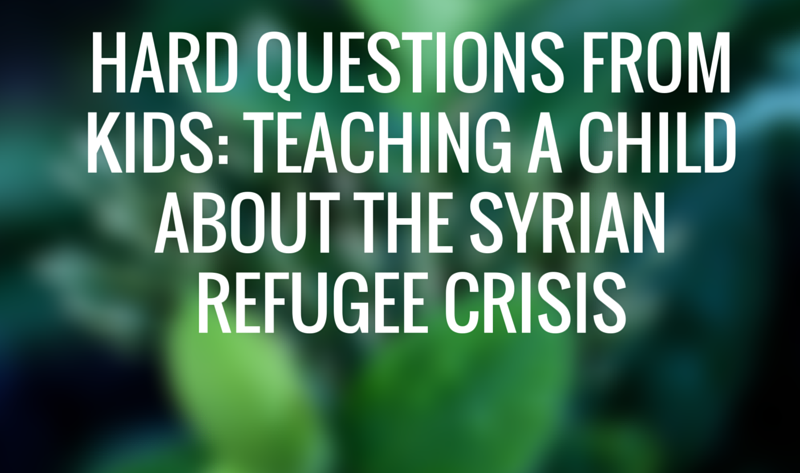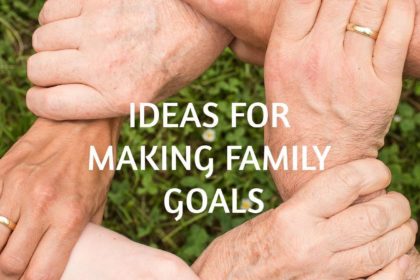This morning we were in the midst of trying to get everyone ready for the day and off to school. My oldest son Aiden, (9 years old) was sitting on the steps putting on his shoes. He was moving slowly and I reminded him of the time and that he needed to be ready. We were watching for my younger son’s bus and going through our schedule for the day when Aiden asked “Mom, what are refugees and why is everyone mad at them?” All I could think was, “how long has he been thinking about this?” Before I could answer the bus arrived. I got my younger son on the bus and then told Aiden that he asked a big question and I didn’t have time to answer it well before he had to be at school. So now my house is quiet and I am trying to figure out the best way to answer his question.
We have had a lot of big questions recently, and while I am glad that my son is becoming more aware of the world around him and is comfortable enough to ask me questions when he doesn’t understand, I have been consistently frustrated by the lack of resources for a parent when trying to answer these questions. I am by no means an expert. Every child is different too and only a parent can truly understand what is appropriate for their child, but I hope by sharing how I answer this question I can help someone else looking for resources.
There are a few goals I want to achieve when we talk about this:
- I want to sufficiently answer his question. I want him to know that I heard him and that I value his desire to learn more.
- I want him to gain a sense of empathy and compassion for refugees. The fact that he has picked up on some of the anger and frustration that some people are feeling about the refugee crisis means that he may not understand that these people are in need and that their situation does not make them bad or less than someone else.
- I do not want to scare him or make him feel like the situation is hopeless. I know he might feel a little of that (I feel those feelings too when I think about it) but I want to give him the tools and ability to deal with those feelings. Part of this is also making sure that we address anything he has seen or heard that is bothering him.
- I want to emphasize the fact that he is safe. I also want to touch on the fact that there are people who do bad things and that if he is in a situation where he feels unsafe, that he should get out. We have discussed this before, so I want to remind him of it and reiterate that he does have tools to protect himself.
- I want to end with some kind of action we can take to help. I know that if there is a world problem that is bothering me, taking action is usually the best way to alleviate anxiety. I want him to understand that it is a big problem, that we can’t fix it completely but we can help.
Answering the Question:
Aiden’s question did not specifically talk about the Syrian crisis, but I know that is where he heard the word refugee. I wanted to first give him a broad definition of a refugee. After thinking about it and looking up dictionary definitions. I plan to tell him that a refugee is a person who has left their own country because of mistreatment, war, or a lack of resources (food, water, a place to live, a job). Most of the time refugees have little to no resources. Sometimes they travel a long way. Some may need medical help.
I also want to show him this video. It is specific to the Syrian crisis. It shows some of the crisis, but I feel the images and information are appropriate for his age and what we have talked about before (we have talked about war and death, but the video does not show shocking images). The person that they interview is a young boy, so I hope Aiden can relate to him.
I hope from here the discussion will be somewhat natural, with Aiden asking questions and me answering them. Just by knowing my goals before hand I’ve found that I come away from answering questions like this feeling like it went well. So I hope goals 2, 3 and 4 come about while we are talking. If they don’t I will make a point to bring them up.
Action We Can Take:
Because most of this crisis is taking place in countries half a world away from us, I knew that most of the action we could take to help would be in the form of monetary donations. I took some time to look up a few organizations that are specifically working to help Syrian refugees. UNICEF provided information on some and I found a few other through internet searches.
A few that I will share with Aiden are:
Update*
I just finished discussing this with Aiden. He has decided to raise funds for International Medical Corps. He is doing yard work and pet sitting for neighbors and wants to save up $50 to donate by the end of the month. This also opened things up to us talking about the fact that there are people right here around us that we can help too. Or we could help by volunteering to improve our community. He is excited to volunteer at a couple of local organizations that we found.





